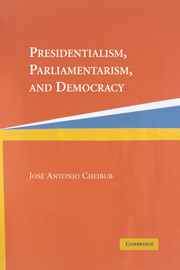Book contents
- Frontmatter
- Contents
- List of Figures and Tables
- Acknowledgments
- 1 INTRODUCTION
- 2 PRESIDENTIAL, PARLIAMENTARY, AND MIXED DEMOCRACIES
- 3 ARE THE INCENTIVES FOR COALITION FORMATION DIFFERENT IN PARLIAMENTARY AND PRESIDENTIAL DEMOCRACIES?
- 4 ARE COALITIONS RARE IN PRESIDENTIAL DEMOCRACIES?
- 5 PARTY DISCIPLINE AND FORM OF GOVERNMENT
- 6 WHAT MAKES PRESIDENTIAL DEMOCRACIES FRAGILE?
- 7 CONCLUSION
- Appendix: Definition and Sources of Variables
- References
- Index
- Cambridge Studies in Comparative Politics
3 - ARE THE INCENTIVES FOR COALITION FORMATION DIFFERENT IN PARLIAMENTARY AND PRESIDENTIAL DEMOCRACIES?
Published online by Cambridge University Press: 05 June 2012
- Frontmatter
- Contents
- List of Figures and Tables
- Acknowledgments
- 1 INTRODUCTION
- 2 PRESIDENTIAL, PARLIAMENTARY, AND MIXED DEMOCRACIES
- 3 ARE THE INCENTIVES FOR COALITION FORMATION DIFFERENT IN PARLIAMENTARY AND PRESIDENTIAL DEMOCRACIES?
- 4 ARE COALITIONS RARE IN PRESIDENTIAL DEMOCRACIES?
- 5 PARTY DISCIPLINE AND FORM OF GOVERNMENT
- 6 WHAT MAKES PRESIDENTIAL DEMOCRACIES FRAGILE?
- 7 CONCLUSION
- Appendix: Definition and Sources of Variables
- References
- Index
- Cambridge Studies in Comparative Politics
Summary
As discussed in Chapter 1, the prevailing argument about the alleged inferiority of presidentialism with respect to governance and survival of a democratic system runs as follows.
Parliamentarism and presidentialism are different in their structures: the former is a system of “mutual dependence” and the latter of “mutual independence” between the executive and the legislature (Stepan and Skach 1993:17–18; Linz 1994:64; Linz and Stepan 1996:181).
Institutions shape incentives: presidentialism generates fewer or weaker incentives to form coalitions (Mainwaring 1990; Stepan and Skach 1993:20; Mainwaring and Scully 1995:33; Linz and Stepan 1996:181; Huang 1997:138).
Coalitions are difficult to form and rarely, “only exceptionally,” do they form under presidentialism (Linz 1994:19).
When no coalition is formed under presidentialism, a “long-term legislative impasse” ensues (Linz and Stepan 1996:181), “there is no alternative but deadlock” (Mainwaring and Scully 1995:33), and “the norm is conflictual government” (Jones 1995:38). As a result, “the very notion of majority government is problematic in presidential systems without a majority party” (Huang 1997:138), “stable multi-party presidential democracy … is difficult” (Mainwaring 1990), and “presidential systems which consistently fail to provide the president with sufficient legislative support are unlikely to prosper” (Jones 1995:38).
Parliamentarism and presidentialism are indeed different, and institutions do shape incentives. But which institutional features of the two systems shape the incentives relevant for coalition formation? What are these incentives? Most importantly, is the difference in incentives sufficient to impede coalitions in presidential systems?
- Type
- Chapter
- Information
- Presidentialism, Parliamentarism, and Democracy , pp. 49 - 67Publisher: Cambridge University PressPrint publication year: 2006



